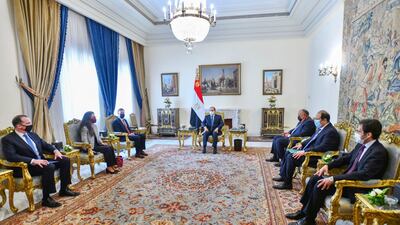Egyptian President Abdel Fatah El Sisi and US National Security Adviser Jake Sullivan have met in Cairo to discuss Libya’s internationally backed political roadmap and the Israeli-Palestinian conflict.
The pair reviewed a wide variety of regional issues at the meeting on Wednesday.
This month, the Biden administration decided to withhold $130 million in military aid to Egypt over human rights concerns. An Egyptian presidential statement on the meeting made no mention of human rights.
Some experts have said Egypt’s ties with the US, particularly over security and counterterrorism, were so deep that the pair could conduct business as usual, even when Washington takes punitive actions against Cairo over human rights or, more recently, arms purchases from Russia.
Mr Sullivan arrived in Cairo after trips to Saudi Arabia and the UAE. He was accompanied by Brett McGurk, White House co-ordinator for the Middle East and North Africa.
The Egyptian statement said President El Sisi and Mr Sullivan had agreed on the need to step up international efforts to ensure the successful conclusion of Libya’s political roadmap.
Egypt, for its part, has been talking in recent weeks with Libya’s key political players to ensure the elections are held in December as scheduled. A fair and transparent vote, Egypt and other stakeholders believe, will help end the decade-long turmoil engulfing the energy-rich nation.
Egypt shares a porous desert border with Libya, which has in the past decade become a haven for extremists. Libyan-based militants have on several occasions infiltrated the border, carrying out deadly attacks against Egyptian security forces and Christians.

“The president has emphasised the importance Egypt attaches to the success of the political track and the withdrawal of all foreign troops from Libya,” the presidential statement said. It was alluding to Turkish military advisers and Turkish-backed foreign fighters who supported the former government based in Tripoli.
Egypt and Turkey have supported rival factions in Libya’s conflict, but Cairo and Ankara have sought to mend ties. Tension between them over Libya was so high last summer that many anticipated hostility.
“They [Mr El Sisi and Mr Sullivan] agreed to intensify bilateral co-ordination and with international partners on preparations for the forthcoming elections in Libya as well as the question of the withdrawal of foreign troops and mercenaries,” said the statement. The talks also touched on the situation in Syria, Iraq, Yemen and Tunisia, it said.
On the Palestinian-Israeli conflict, the statement said the two sides discussed ways to “revive” the peace process, which broke down in 2014. Egypt, a close US ally since the 1970s, has been seeking to cement the truce it brokered to end an 11-day war between Israel and Gaza’s Hamas group in May.
Persistent demands
Five months after the cessation of Israel-Hamas hostilities, Egypt was locked in intense, behind-the-scenes negotiations to secure a prisoners’ exchange between the two sides.
Israel wants this to happen before it allows the reconstruction of Gaza to proceed, according to Egyptian security officials.
Egypt’s mediation, they said, is made all the more complex because of persistent demands by President Mahmoud Abbas and his Ramallah-based Palestinian Authority that they are not left out of dealings between Israel and Hamas or the reconstruction of the densely populated coastal enclave.
The Palestinian Authority and Hamas have been at sharp odds since the militant group threw out representatives of the PA in a 2007 civil war in Gaza. Hamas has since been the sole ruler of the strip.


